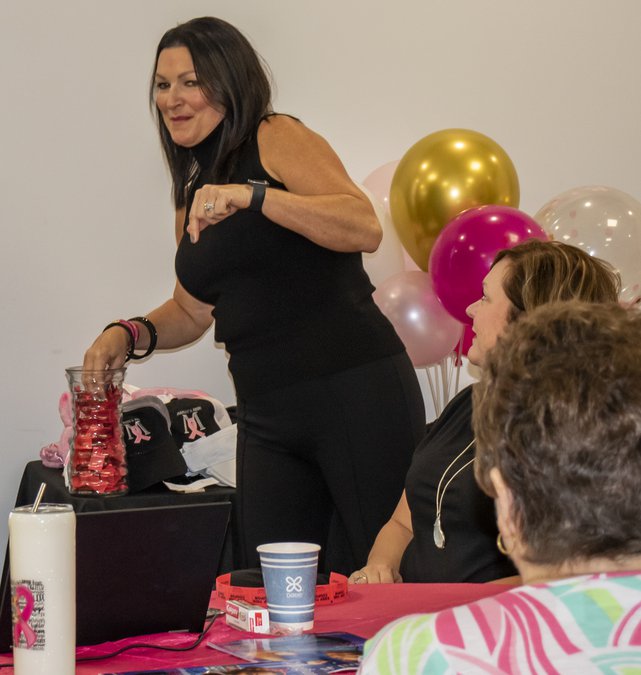RINCON — Delicious chicken and waffles wasn’t the most important item served during Boobie Brunch 2021 at The Herald Center.
It was information about breast cancer that Rincon native Margie Singleton and others dished out that was crucial to the Oct. 13 event. Singleton is a breast cancer survivor who turned negative personal circumstances into a positive development for women all over Georgia.
“I don’t think we have enough events to celebrate and get breast cancer awareness out there,” Singleton said. “I do appreciate the Herald and and thank you for asking me to come ... Because Margie’s Army is our foundation, we are very passionate about breast cancer awareness, specifically breast density.”
Breast density reflects the amount of fibrous and glandular tissue in breasts compared with the amount of fatty tissue.
After being diagnosed with breast cancer following a trio of 3D mammograms that didn’t detect the disease, Singleton set out to make sure that other women don’t suffer the same fate. Starting in 2018, she fought for legislation that would require mammography providers to notify women if they have dense breast tissue that makes mammograms unreliable.
Singleton’s dream became a reality May 2, 2019, when Gov. Brian Kemp signed House Bill 62, which was championed by Rep. Bill Hitchens. According to “Margie’s Law,” patients found to have dense breast tissue will receive a text that says:
Your mammogram shows that your breast tissue is dense. Dense breast tissue is very common and is not abnormal. However, dense breast tissue can make it more difficult to detect cancer through a mammogram. Also, dense breast tissue may increase your risk for breast cancer. This information about the result of your mammogram is given to you to increase your awareness. Use this information to talk with your health care provider about whether other supplemental tests in addition to your mammogram may be appropriate for you, based on your individual risk. A report of your results was sent to your ordering physician. If you are self-referred, a report of your results was sent to you in addition to this summary.
Singleton’s cancer was discovered after two mammograms missed it because of her dense breast tissue.
“Dense breast tissue looks just like cancer on a mammogram,” a doctor said to her.
There are four breast density categories:
A – The breasts are almost entirely fatty.
B – There are scattered areas of fibroglandular density.
C – The breasts are heterogeneously dense, which may obscure small masses.
D – The breasts are extremely dense, which lowers the sensitivity of mammography.
Following her diagnosis, Singleton endured six rounds of chemotherapy, 25 rounds of radiation, a double mastectomy, breast construction and a hysterectomy. In the wake of her recovery, she and many of her friends, dubbed “Margie’s Army,” started raising breast cancer awareness.
“It consists of an amazing group of women and men,” Singleton said. “We get out there and we educate, we give back to the community and we try to raise awareness and spread the word about breast density.”
Singleton then shared a few breast cancer cases that inspired her to fight for Margie’s Law, which made Georgia the 38th state to require notifications about dense breast tissue.
“Everybody knows Margie Singleton had breast cancer because of the breast density issue but it happens so much more than you realize,” she said.
A breast cancer survivor identified as Liane told the Boobie Brunch gathering, “I knew I had dense breast tissue so I had followed Margie’s story — our kids go to school together — so I called by GYN doctor and said, ‘I want an ultrasound along with my mammogram.’ ”
Liane, a nurse from Savannah, said she received a great deal of “pushback” about her request. She said she refused to leave the doctor’s office until she received an ultrasound even though her mammogram results were good.”
“I had no reason to believe that anything was going on,” she said. “I mean I exercise and I eat right — except for today — and I do self breast exams. I do all the things that I am supposed to do but I knew Margie’s journey and I know they had missed it three times on hers so I wasn’t leaving.”
Liane’s insistence led to the discovery of a tiny cancerous tumor in her left breast.
“That ultrasound — and Margie — saved my life,” she said before embracing Singleton.





